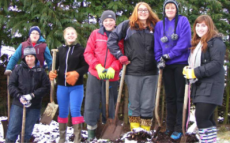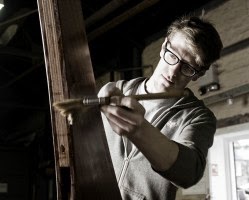Book review: The New Road: Charting Scotland’s Inspirational Communities
This book does what it says on the cover!
by Alf Young and Ewan Young, Argyll Publishing
 This is a truly encouraging book, delightfully written, in the form of a one-week rail and road trip around Scotland, seeing what’s new and working well in raising community resilience. It has just the right amount of practical detail and atmospheric colour.
This is a truly encouraging book, delightfully written, in the form of a one-week rail and road trip around Scotland, seeing what’s new and working well in raising community resilience. It has just the right amount of practical detail and atmospheric colour.
I also appreciated the way this book has a light touch on editorial, and mostly lets the people and their projects do the talking. The overall picture that emerges has been an important part of my conclusions about how the community resilience sector works in the UK currently. Here are some of my key conclusions, which this book supports:
- There are good working examples of raising resilience in most key aspects (e.g. food, energy, employment), but… these are rarely replicated.
- They usually involve an innovative, practical initiative in a physical local community, with a lot of human interaction, and they have deepened the quality of community in that locality.
- They were led by and for local people, but mostly initiated and driven along by one or a few superhuman people, pioneers who persisted despite huge obstacles.
- They often depended on unusual funding sources – for example, raising funds from the community itself, even poor ones, or a brief window when grant funds were available.
- They managed to engage the hearts, fire up the motivation, overcome the scepticism, of many people in their local community, and gain fairly widespread support and active involvement.
Here are a few of the authors’ perspectives:
“For communities to take more responsibility for their own destinies requires an unbelievable amount of hard work…Not just …the small numbers of people trusts can afford to employ. Especially from the countless volunteers…”.
“it often feels as if each community setting foot on this new road has to redraw, from scratch, the map that will shape its journey.”
“to prosper in the long-term, we believe all trusts may have to turn themselves into social enterprises of genuine scale”.
Here are some of the specific projects featured in the book:
Dunbar: Artisan bakery, community owned and funded. The umbrella organisation is a Community Development Trust, which grew out of a local consultation.
Twechar: A rundown former mining village took over the leisure centre from the local authority when it was due for closure, and has made it a real community hub.
Burntisland: Mike Small and the Fife Diet. It started with communal meals of local produce in the village hall. Funded by the Climate Challenge Fund.
Fintry, nr Stirling: Development Trust raised funds (from 50% of all local adults) to invest in part of a local commercial wind farm: after 2022 when capital repaid should generate £0.5m annual income. Also car club and many other community facilities.
Govan, Gal Gael: Centred on a workshop teaching physical skills, eg building traditional boats. Pioneered a 12 week programme for local young people, ‘Navigate Life’: craft skills and field trips into nature. Thursday evenings open house: music, food, company.
Neilston, south of Glasgow: Development Trust led by a dynamicc local woman: created a Town Charter with 44 project aims by 2030. Funding a key issue – the 44 would cost £15m or more. Raised money to buy a share of a local windfarm, will bring in £0.5m per annum from 2018.
Renton, West Dumbartonshire: locals created a Community Housing Association: has refurbished rundown social housing, built mixed tenure new homes, and created a new, 40-apartment, extra care facility for local older people. It has also created, rented, then sold a successful 3000 square feet retail unit, and has built a new Healthy Living Centre, and a community centre (cafe, sports, meeting rooms).
Comrie, Perthshire: Set up a development trust, bought a redundant military camp with 96 acres – now includes food growing by local people, small business spaces, sports etc.
Forres: Transition Town Forres: Carin Schwartz, ex-Findhorn, a prime mover. Innovative community allotment.
Sleat, Skye: Sleat Community Trust: took over the petrol station after it shut down, it’s now also the local post office and visitor info centre. SCT has also bought the 1000 acre Tormore Forest nearby: provides a long-term revenue flow. The purchase was backed by Highlands & Islands Enterprise Trust, and Triodos Bank.
Eigg: The islanders bought the island. Have set up their own energy supply company, 90% renewable sources. It also has a forest business, and a 24-bed luxury hostel and outdoor centre.
